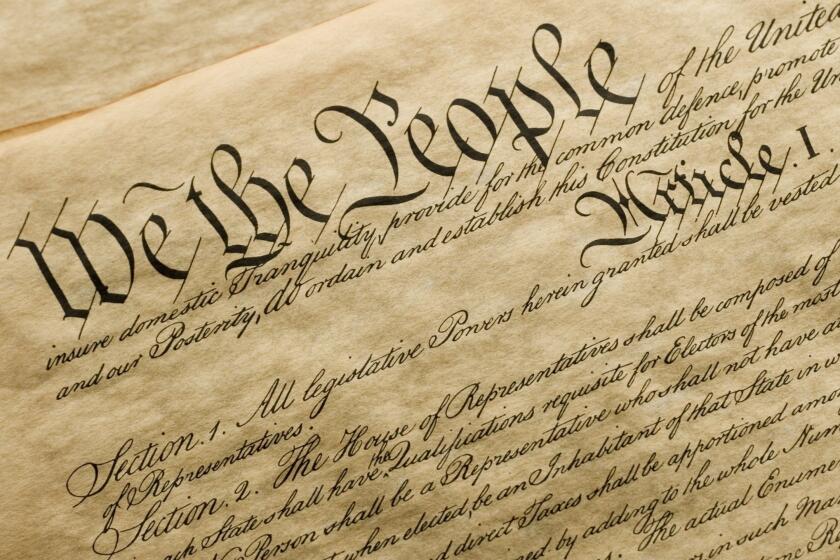Be thankful for the independent judiciary

- Share via
This year I’m giving thanks for the independent judiciary.
In the last four years, we have witnessed an unprecedented assault on the institutions of government and civil society and many of these attacks have been alarmingly successful. By and large, however, the courts have held. President Trump has not been able to co-opt them or bend them to his bidding.
Not that he hasn’t tried. It started before the 2016 election, when candidate Trump alleged that a judge who was to preside over a pair of fraud cases involving Trump University had an “absolute conflict” because he was Mexican. In fact, the judge was born in Indiana; his parents had emigrated from Mexico.
According to Trump, the judge’s national heritage would bias him because of the campaign’s anti-Latino rhetoric and the promise to build a border wall between Mexico and the United States. (That the wall is still mostly a pipe dream is another reason to give thanks.)
Trump’s jaundiced view that judges serve their friends and patrons, not the law, has remained to the last. He has been open in his expectation that the three justices he appointed to the Supreme Court would rule for him if presented with an election-deciding case. On Saturday, when U.S. District Judge Matthew Brann, of Pennsylvania, issued a blistering opinion against the president’s attempt to throw out that state’s votes, he tweeted that Brann was “a product of Senator Pat ‘No Tariffs’ Toomey of Pennsylvania, no friend of mine.”
James Madison was right. The electoral college is a shoddy piece of work that keeps coming back to haunt us.
From the outset of Trump’s administration — in a series of decisions blocking the president’s initial Muslim bans in January 2017 — federal judges have not shied away from scrutinizing the administration’s hyper-aggressive executive orders and slapdash administrative work. All in all, the president and his lawyers have posted a dismal record of 28-131 in legal challenges to the use of government agencies to deregulate or otherwise implement policy.
And when it comes to criminal prosecutions, the federal courts have also had little problem defying the president. U.S. District Judges Amy Berman Jackson and Emmet G. Sullivan, in particular, have given no quarter to Trump cronies Michael Flynn, Paul Manafort and Roger Stone when overseeing their prosecutions in Washington. (Trump, however, pardoned Flynn on Wednesday, and he previously commuted Stone’s prison sentence.)
Even at the ever-more-conservative Supreme Court, the administration has lost more than half of its cases, the worst bottom line of any president since Franklin D. Roosevelt. Trump’s failures in the high court included an attempt to add a citizenship question to the census and to undo crucial portions of the Deferred Action for Childhood Arrivals, or DACA, program. (It is worth noting, though, that every administration since FDR’s has done slightly worse than its predecessor at the high court.)
The judiciary’s independence has been on particular display in the last three weeks. Again and again, judges at the state and federal level have eviscerated the Trump campaign’s effort to steal the 2020 election. They have forced the president’s lawyers to abandon allegations of fraud, conceding that the attorneys could produce no supporting evidence.
Compare the administration’s record in the courts with the state of play in the rest of government. Sifting through the rubble at the end of Trump’s presidency, we find a broken Senate and a dysfunctional legislature, a presidency corrupted by lies and apparent self-dealing, and compromised agencies as important as the Centers for Disease Control and Prevention and the U.S. Postal Service. Core Washington institutions are in the grip of leaders scared of the president and in thrall to his caprices.
However, even an independent judiciary couldn’t foil all of Trump’s egregious constitutional mischief. Between delaying tactics, issues of standing, and the Justice Department rule that sitting presidents can’t be indicted, the president has managed to avoid judicial reckoning for a lot of bad conduct — ignoring subpoenas, flouting the emoluments clause, and as the Mueller report documented, engaging in apparent obstruction of justice.
It’s also true that over the last few years a handful of judges, perhaps hoping for a Supreme Court appointment, have issued unconvincing opinions in his favor. U.S. District Judge Neomi Rao is one example; among other outlier decisions, she sided with dropping the case against former national security advisor Michael Flynn, despite the fact he twice pleaded guilty to lying to the FBI.
Such toadying to the president isn’t good, but it’s not unique to this administration. Worse, and altogether Trump’s doing, we must brace for a flood of society-altering far-right opinions from the Supreme Court’s new majority and from roughly 200 Trump-appointed lower court judges.
Nonetheless, the courts as an institution never went in the tank for Trump, nor seemed at real risk of doing so. Federal judges aren’t morally superior to other public servants, but because they have life tenure, they are insulated from Trump’s favored disciplinary tool: termination by Twitter.
President Trump was able to bulldoze through too many checks and balances, but with the judiciary, the framers’ design proved up to the task. The court’s track record isn’t quite a turkey dinner with all the trimmings, but it can provide us with sustenance as we enter an otherwise precarious holiday season.
More to Read
A cure for the common opinion
Get thought-provoking perspectives with our weekly newsletter.
You may occasionally receive promotional content from the Los Angeles Times.










